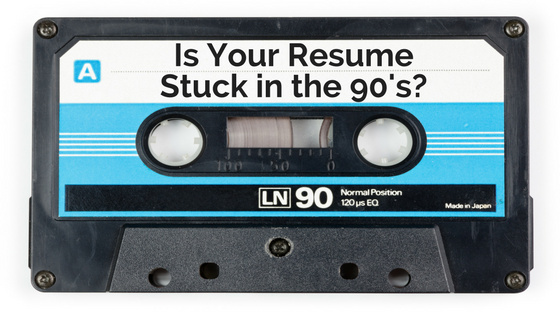Abandon these 7 Things to Avoid a Stale Resume
Antiquated Email Accounts
Our recruiters look at hundreds of resumes a day. When they see a resume that has an “AOL” or “Hotmail” email address, it prompts them to think that the candidate may not be versed in current technology. While that may not be the case, it is the perception. If you don’t have other evidence within your resume that indicates that you are well acquainted with current technology, it could take you out of the running for certain jobs. Because technology has infiltrated virtually every aspect of our lives, the likelihood that you will need basic computer and technology skills to be considered for a position is strong. You should consider updating your email address in order to avoid any misconceptions about your abilities. Along these same lines, you should not continue to use “.edu” or other university email addresses more than a year after you graduate. Using a college email address for too long after graduation may belie your experience and give the impression that you are entry-level. You might be reluctant to change your email address because it’s not always the easiest task. Everyone in your network and family has it. You might be using it for several online accounts and social media. Monster.com recommends that you create an additional email that you can use specifically to apply to jobs. Creating separate personal and professional email accounts will also help you avoid inadvertently sending things of a more personal nature to people in your professional network.
Troublesome Resume Formatting
The simple truth is that if your resume can’t be opened or is difficult to open, a recruiter or hiring manager will most likely just give up and move on to the next submission. Most of us in the job-seeking world created our resumes in some version of Microsoft Word. Unfortunately, we all have different versions of the software, making it difficult to open or read some documents. The “.doc” format was utilized as part of MS Word versions from 1997-2003, so basically, it’s totally 90’s. Our recruiters recommend saving your resume in a .docx format simply because it is supported by versions of the software from 2007 onward. You may be tempted to send your resume in PDF format to preserve the fonts and formatting. Recruiters and hiring managers may need to copy, paste, and share or edit portions of your resume. Your recruiter will appreciate it if you send it to them in the form of a Word document to facilitate this. We caution candidates against presenting a templated or artistic-type resume. More “outside the box” resumes are impressive to some audiences, and may even be necessary if you’re a graphic designer. For more conservative roles, you’re better off with a more traditional chronological resume format. It’s important to note that if a recruiter or company requests your resume in a specific format that you should follow those directions above any industry recommendations.
Early Career Experience
Ideally, your resume should be highly targeted to each position to which you are applying, rather than an autobiography of every job you’ve ever held. A job or project you worked on 12-15 years ago is not really necessary information for target audience. You don’t need to list the entry-level job or internship you held in 1995. A previous Bradley blog recommends including no more than 10 years of reverse chronological job history. If you are a recent graduate, internship experience can help fill out your resume when you don’t have a lot of work experience. If you are a more seasoned candidate with 3-5 years of work experience, you should start to filter out this information in favor of adding other more recent and relevant skills that you have developed. Including your college degree information is enough. It is not necessary to list your high school, college graduation year or GPA once you’ve accrued 3+ years of job market experience.
Cover Letter and Objective
Social media plays such a huge role in recruiting these days that it has virtually made cover letters obsolete. According to Monster.com, recruiters and hiring managers simply don’t have time to read a cover letter. The Ladders.com published a widely shared article revealing that on average, recruiters will look at a resume for about 6 seconds before they make a decision about a candidate. Your efforts are better spent focusing on creating bulleted facts and supporting evidence that you have the skills to do the job. In the event that a cover letter is requested or is appropriate in a given situation, it should be addressed to a specific individual. It should briefly explain how you heard about the opportunity, how your skills match those needed for the job, your availability to meet, and how you can best be contacted. The objective section of your resume has also become an unnecessary element. For a recruiter to find your resume online, it is essential that it contain relevant, searchable language. Beyond.com recommends including a career summary instead, and offers some tips for doing this effectively.
Old Fashioned Communication Methods
If a recruiter or hiring manager thinks you are the right fit for a position, you want to make it easy for them to contact you. For most of us, that means putting a cell phone number as the best contact number. If an employer calls you and hears an answering machine recording, they’re going to make assumptions about your grasp of technology. Shared voicemail is also risky for your job search because if your roommate or a family member deletes a message, you will have lost an opportunity. Additionally, if you’re actively searching for a job, don’t allow your voicemail to fill up to a point where an employer or recruiter can’t leave a message. In this highly digital age, we’ve become accustomed to having convenient access to people. Recruiters and hiring managers are no different, and will most likely move on to the next candidate if they are unable to reach you the first time. In addition your resume should also include a link to your LinkedIn profile, since 94% of recruiters use it to vet candidates.
References
While it was definitely more common years ago to include references in your resume, Bradley Staffing Group does not recommend this. In the interest of privacy and confidentiality, you should have references available and be ready provide them if requested. It is also not necessary to include the phrase “References available upon request” on your resume. It is a given that you should be willing to provide resources that will affirm that you are a good hire. The references you provide should also be employers or supervisors that you worked for more recently. Recruiters and hiring managers want to know what kind of employee you are now. A reference from 10 years ago may not even be aware of new skills, certifications or career development, and will not make the strong impression you are seeking.
Outdated Software and Terms
Your resume should demonstrate that you are a candidate that is actively utilizing current software and technology. You should include those software programs that you are working in now, but you should remove any software or operating system that has become obsolete or less widely used in your industry. If your list of technical skills currently includes “word processing”, “MS-DOS”, “AS/400” (or any other IBM system for that matter), your resume is long overdue for an update. U.S. News and World Report cautions that simply stating “Microsoft Office Suite” is not a sufficient way to describe your skill level. It will not give you an edge because in the modern era, hiring managers assume applicants already know the basics. You should mention your specific abilities in programs like PowerPoint and Excel, since these are widely used among many organizations. The use of corporate buzz words and industry jargon in your resume are also inclined to make recruiters and hiring managers cringe. According to Mary Lorenz, a corporate-communications manager at CareerBuilder, many buzzwords like “People person”, “Results-driven” and “Seasoned” are so overused that they’ve lost meaning, and fail to differentiate a job seeker from other candidates because they’re so generic. Instead, you should speak about specific goals you have met or problems you’ve solved to demonstrate your abilities.
Your resume is like a marketing piece that gives employers an overview of your skills and qualifications. At minimum, it should be accessible and easy to open, clear and legible. In addition to being accessible, your resume needs to have a user-friendly layout. You should treat your resume like a living, breathing thing that evolves as your skills and experience increase. Update it for each new position that you are seeking In addition to being accessible, your resume needs to have a user-friendly layout and appearance. If the text is hard to read, it is likely that a recruiter won’t even get past the contact information at the top of the page. Font size should be 12 point and Times New Roman because it is a universal font. Using any other font outside of recommended safe universal web fonts may not display as you intended, so it’s best to keep it simple.
Bradley Staffing Group is a full-service staffing firm based in Wayne, PA. We are committed to matching A-level talent with best-in-class businesses. Our knowledgeable and well-trained staff brings a combined 70+ years of staffing experience to our clients and candidates alike. http://useful-sock.flywheelsites.com/contact-us/











Leave a Reply